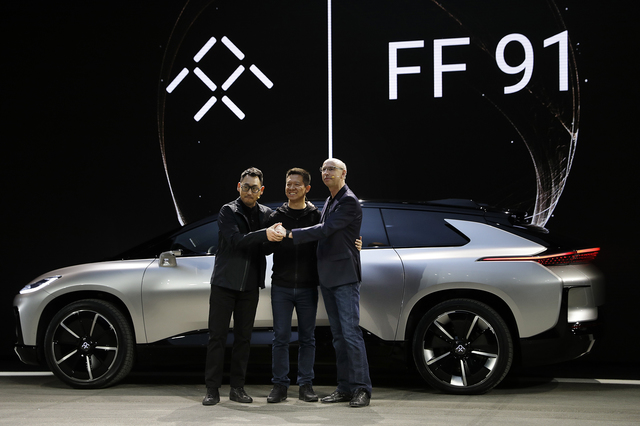Faraday Future offers peek of electric car to CES crowd
Faraday Future, the electric car startup that’s promised to build a $1 billion plant in North Las Vegas, gave audiences a look at its FF 91 electric car late Tuesday at a CES 2017 event in Las Vegas.
Company representatives did a live demonstration before an audience of cheering fans and international press to show the difference between the FF 91 and other car brands when going from 0 to 60 mph.
The Faraday car made no noise and emitted no burning odor, as a couple of competitor Tesla brand cars did — but unlike a Ferarri driven on the test track at Las Vegas Market in downtown Las Vegas.
“What you’re smelling is the legacy of gas-powered cars,” propulsion engineering vice president Peter Savagian told the audience.
Executives say the car’s modular architecture and flexible battery layout will allow for a faster rollout of future models. The car will have a range of about 378 miles per charge. Its electric motors will generate a combined 1,050 horsepower.
The FF 91, a long, low, futuristic SUV with a roomy interior, will have no handles; doors will open as a driver approaches. Holograms will be projected on the windshield to alert drivers of needed information.
The car will come equipped with a package of sensors, including cameras, radar and lidar, to enable self-driving capability at a future date.
Multiple leading carmakers are expected to show new products at CES, but Faraday in particular has made lofty promises. Recruited to Nevada with a $215 million incentive package of tax breaks and improvement projects, Faraday has fought off accusations of fraud from the state treasurer and reports of missed payments and departed executives.
The hope is Faraday and another tenant of the Apex Industrial Park, Hyperloop One, will bring a new technology industry into a state whose leaders are hungry for an economy with more than gaming and tourism.
In an interview after the event, Senior Vice President of Research and Development Nick Sampson declined to say when construction of the North Las Vegas site will start again. But he said Faraday will complete it.
“It will finish in time to deliver the cars in 2018,” Sampson said.
During the event, through a video feed to the market parking lot, Faraday representatives showed the FF 91 drive itself into a parking space. However, the car would not drive on its own on the CES stage test track to show how it could pull into a garage. In a second attempt, the car inched forward shortly before Sampson concluded the event.
“It’s a little bit lazy tonight,” he joked to the audience.
At last year’s CES, Faraday presented a one-seater concept car called FFZero1 that resembled the car driven by comic book hero Batman but has a connection to the driver’s smartphone. The FF 91 at this year’s CES had four seats, two doors, an interior based on airplanes and an exterior designed with the clean look of a smartphone.
Also presenting at the event was the financial backer of Faraday, Yueting “YT” Jia, founder and CEO of Chinese conglomerate LeEco.
“This is my dream,” Jia said.
Sampson told the audience that people interested in the car can register at Faraday’s website at ff.com and make a refundable $5,000 deposit. Those people will have the change to reserve a premium edition of the car, which will have an exclusive color and limited production of 300 units.
“Despite all the skeptics, despite all the naysayers, we will persist,” he said.
CES 2017 formally opens in Las Vegas on Thursday. The long-running trade show is produced by the Arlington, Virginia-based Consumer Technology Association. As many as 175,000 people are expected.
Correction: This story has been corrected to reflect that Hyperloop One is another tenant at Apex Industrial Park.
Reuters contributed to this report. Contact Wade Tyler Millward at 702-383-4602 or wmillward@reviewjournal.com. On Twitter: @wademillward





























